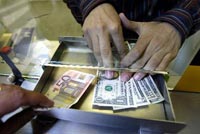Euro continues to rise against the U.S. dollar
The euro rose Thursday against the U.S. dollar, which has been under pressure as U.S. data showed that construction of new homes plunged last month, while consumer inflation came in only slightly above expectations.

The euro bought US$1.4245 in morning European trading. That put it within sight of its all-time high of US$1.4282, reached Oct. 1, and was above the US$1.4186 it bought in New York late Wednesday.
The British pound climbed to US$2.0414 from US$2.0355. The dollar slipped to 116.35 Japanese yen from 116.55 yen.
The dollar weakened to record lows against the euro after the U.S. Federal Reserve last month lowered interest rates by a larger-than-anticipated half percentage point. Amid speculation that another cut could follow, the euro reached an all-time high of US$1.4282 on Oct. 1.
On Wednesday, the U.S. Commerce Department said that construction of new homes plunged by 10.2 percent in September, reflecting the deepening troubles in the U.S. housing sector.
Meanwhile, the Labor Department said its Consumer Price Index increased by 0.3 percent last month as energy costs and food prices rose. That was slightly ahead of the 0.2 percent economists had expected, but unlikely to be a barrier to a further interest rate cut.
Core inflation, which excludes energy and food, was up a more moderate 0.2 percent, in line with expectations.
The release of the Fed's Beige Book, which measures business activity and sentiment, reported cooling third-quarter economic activity and lower business confidence. The report, coming on top of mixed third-quarter corporate earnings and continuing worries over the housing sector, intensified investors' recession worries.
Economists have mixed feelings about the Fed's next move. Employment reports for September have been positive, but the lingering credit crunch and signals of economic slowdown may trigger further rate cuts.
Lower interest rates, used to jump-start the economy, can weaken a currency as investors transfer funds to countries where their deposits and fixed-income investments bring higher returns.
Subscribe to Pravda.Ru Telegram channel, Facebook, RSS!


